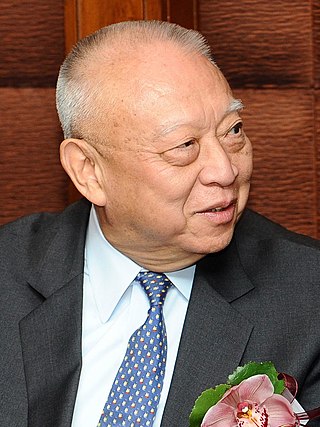
Tung Chee-hwa is a Hong Kong businessman and retired politician who served as the first Chief Executive of Hong Kong between 1997 and 2005, upon the transfer of sovereignty on 1 July. He served as a vice chairman of the Chinese People's Political Consultative Conference (CPPCC) between 2005 and 2023.

The chief executive of the Hong Kong Special Administrative Region is the representative of the Hong Kong Special Administrative Region and head of the Government of Hong Kong. The position was created to replace the office of governor of Hong Kong, the representative of the monarch of the United Kingdom during British rule. The office, stipulated by the Hong Kong Basic Law, formally came into being on 1 July 1997 with the handover of Hong Kong from the United Kingdom to the People's Republic of China.
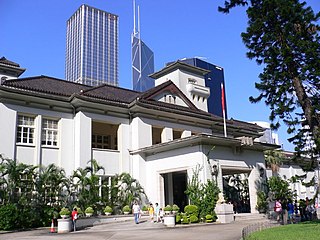
Government House, located on Government Hill in Central, Hong Kong, is the official residence of the Chief Executive of Hong Kong. It was constructed in 1855 as a Colonial Renaissance-style building, but was significantly remodelled during the Japanese occupation, resulting in the current hybrid Japanese-neoclassical form.

The Executive Council of Hong Kong (ExCo) is the cabinet of the Government of Hong Kong, acting as a formal body of advisers to the Chief Executive of Hong Kong that serves as a core policy-making organ assisting the Chief Executive. It is analogous to other Executive Councils in the Commonwealth such as the Federal Executive Council of Australia, the Executive Council of New Zealand, and the Privy Council of the United Kingdom.

Henry Fok Ying Tung was an entrepreneur and politician in Hong Kong. From 1993 until his death, Fok served as Vice Chairman of the National Committee of the Chinese People's Political Consultative Conference. He was one of the Hong Kong's wealthiest persons.
The 1996 Hong Kong Chief Executive election was held on 11 December 1996 to select the first Chief Executive (CE) of the Hong Kong Special Administrative Region (HKSAR) which term started from 1 July 1997 after the Chinese resumption of sovereignty over Hong Kong from the British rule. It was selected by the 400-member Selection Committee installed by the Government of the People's Republic of China (PRC). Tung Chee-hwa, a Shanghai-born Hong Kong businessman who was seen being favoured by Jiang Zemin, General Secretary of the Chinese Communist Party, was the ultimate winner of the election, defeating former Chief Justice Ti-liang Yang and tycoon Peter Woo with a large margin.

The 2002 Hong Kong Chief Executive election was to select the second term of the Chief Executive (CE) of the Hong Kong Special Administrative Region (HKSAR). Incumbent Tung Chee-hwa was nominated by the 800-member Election Committee (EC) without competition.
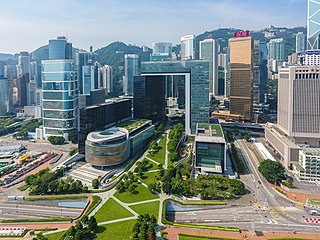
The Central Government Complex has been the headquarters of the Government of Hong Kong since 2011. Located at the Tamar site, the complex comprises the Central Government Offices, the Legislative Council Complex and the Office of the Chief Executive of Hong Kong. The complex has taken over the roles of several buildings, including the former Central Government Offices (CGO), Murray Building and the former Legislative Council Building.
Tung Chee-chen, GBS, SBS, JP is a Hong Kong billionaire businessman. He is the chairman and chief executive of shipping company Orient Overseas and a member of the One Country Two Systems Research Institute, a pro-Beijing political thinktank. He is Monaco's honorary consul to Hong Kong.

Office of the Chief Executive (CEO) is one of the government agencies for the Hong Kong Special Administrative Region. It consists of the immediate staff to the Chief Executive of Hong Kong and multiple levels of support staff reporting to the Chief Executive. The current director is Carol Yip, making her the first woman to hold the office.

The 1999 Hong Kong District Council elections were held on 28 November 1999 for all 18 districts of Hong Kong, for 390 members from directly elected constituencies out of total 519 council members. It was the first District Council election after the handover of Hong Kong in 1997, replacing the existing Provisional District Councils appointed by Chief Executive Tung Chee-hwa.
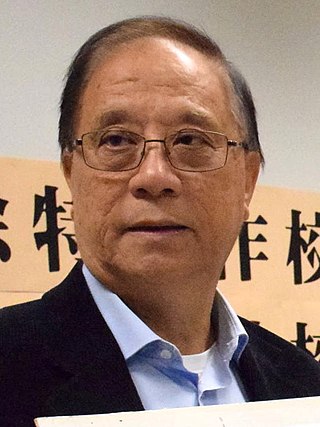
The 2003 Hong Kong District Council elections were held on 23 November 2003 for all 18 districts of Hong Kong, 400 members from directly elected constituencies out of total 529 council members. It was the second District Council election after the handover of Hong Kong in 1997.

Southern District Council is the district council for the Southern District in Hong Kong. It is one of 18 such councils. The Southern District Council currently consists of 20 members, of which the district is divided into two constituencies, electing a total of 4 members, 8 district committee members, and 8 appointed members. The last election was held on 24 November 2019.

The Kowloon City District Council is the district council for the Kowloon City District in Hong Kong. It is one of 18 such councils. The Kowloon City District Council currently consists of 20 members, of which the district is divided into 2 constituencies, electing a total of 4 members, 8 district committee members, and 8 appointed members. The last election was held on 10 December 2023.

The Sham Shui Po District Council is the district council for the Sham Shui Po District in Hong Kong. It is one of 18 such councils. The Sham Shui Po District Council currently consists of 20 members, of which the district is divided into two constituencies, electing a total of 4 members, 8 district committee members, and 8 appointed members. The last election was held on 10 December 2023.

The Wong Tai Sin District Council is one of 18 such district councils in Hong Kong, representing the Wong Tai Sin District. The Wong Tai Sin District Council currently consists of 20 members, two members were each elected from one of 2 constituencies, 8 district committee members, and 8 appointed members. The latest election was held on 10 December 2023.
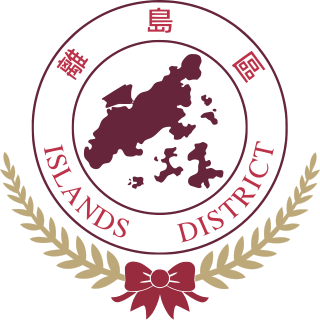
The Islands District Council is the district council for the Islands District in Hong Kong. It is one of 18 such councils. The Islands District currently consists of 18 members, of which the district is divided into 10 constituencies, electing a total of 10 with 8 ex-officio members who is the Peng Chau, Lamma North, Tung Chung, Lamma South, Tai O, Lantau South, Mui Wo and Cheung Chau rural committee chairmen. The latest election was held on 24 November 2019.

The Second term of Tung Chee-hwa as Chief Executive of Hong Kong, officially considered part of "The 2nd term Chief Executive of Hong Kong", relates to the period of governance of Hong Kong since the handover of Hong Kong, between 1 July 2002 and 12 March 2005 until Tung Chee-hwa resigned from the office and the rest of the term was taken up by former Chief Secretary for Administration Donald Tsang.

The First term of Tung Chee-hwa as Chief Executive of Hong Kong, officially considered part of "The 1st term Chief Executive of Hong Kong", relates to the period of governance of Hong Kong since the transfer of sovereignty over Hong Kong, between 1 July 1997 and 30 June 2002. Tung Chee-hwa was elected in 1996 by 400-member Selection Committee as the first Chief Executive of Hong Kong.
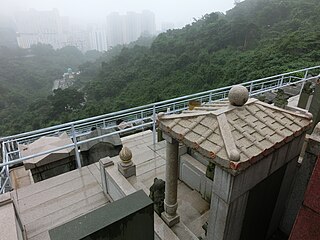
Hong Kong Buddhist Cemetery is a private cemetery located in Cape Collinson, on Hong Kong Island, Hong Kong. It is managed by The Hong Kong Buddhist Association (香港佛教聯合會). The cemetery was completed and opened in 1963.















